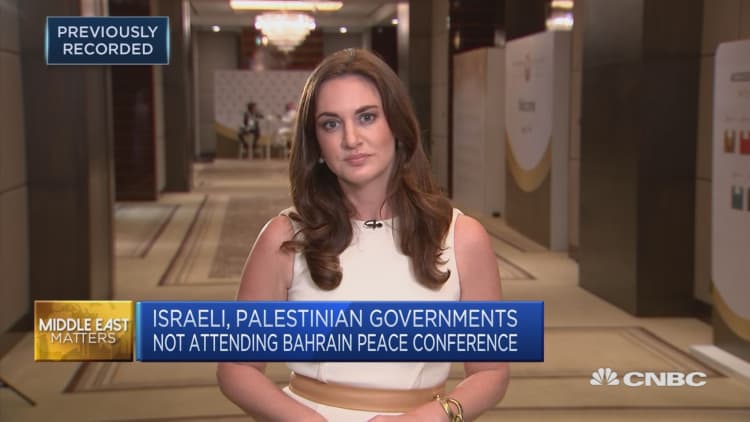The White House's plan for economic growth and peace in the Middle East that's set to be presented by senior advisor Jared Kushner at a summit in Bahrain this week has already been met with skepticism.
Experts have told CNBC that the summit is a waste of time given that neither Israel nor Palestine are attending. Kushner, President Donald Trump's son-in-law and a White House senior advisor, will be presenting the administration's $50 billion Peace to Prosperity plan in Manama on Tuesday. The plan calls for an investment fund to boost growth and jobs in Palestine, as well as its neighboring economies, over the next 10 years. Among other business projects, it envisages "major investments in transportation and infrastructure projects (that) will help the West Bank and Gaza," the White House said, previewing the plan Saturday.
It's part of a larger Middle East peace plan (yet to be revealed) that the White House has called "the deal of the century" but the proposal has its critics. Palestinian Authority President Mahmoud Abbas reportedly stated in late May that the deal can "go to hell," adding that "the same goes for the Bahrain economic workshop that they are planning for the next month, in order to sell us more and more illusions."
The summit this week is being hosted by the U.S. Treasury, the White House, the government of Bahrain and its ministry of finance. Some 300 guests will be there, including Christine Lagarde of the International Monetary Fund, Blackstone's Steve Schwarzman and former U.K. Prime Minister Tony Blair. Other confirmed delegations are primarily from Saudi Arabia and the United Arab Emirates while Jordan and Egypt have said they will attend, but not at a ministerial level. Notably, Palestinian and Israeli officials will not be in attendance.
The absence of officials from the two governments on which the event is purportedly focused makes the event all the more pointless, says Hussein Ibish, senior resident scholar at the Arab Gulf States Institute in Washington (AGSIW), told CNBC Monday.
"It tells me that the whole thing is a complete waste of time," Ibish said.
Concrete development plans, rather than the 'vision' Jared Kushner and White House Israel advisor Jason Greenblatt have often referenced when describing the workshop, are off the table without any Israeli or Palestinian officials present, as is the promotion of Israeli-Arab reconciliation or 'normalization', Ibish said. "So what's the point?," he asked. "Almost everyone I know fears the worst."
The White House was not immediately available when contacted by CNBC. Kushner told Reuters in a recent interview that he sees his detailed formula as a game-changer despite the criticism.

Academics have also dismissed the Peace and Prosperity plan as it stands, insisting that a political solution to the long-running conflict between Israel and Palestine is what's needed. They added that Trump's policies toward Israel and Palestine had also signaled a shift away from a two-state solution regarded by many as the best possible (and perhaps only) way of ensuring a peaceful coexistence between the two sides. Regional scholars fear the Trump administration has done too much to damage its role as an "honest broker" in the peace process.
In addition to recognizing Jerusalem as Israel's capital, a flashpoint that had always been dependent on inclusive negotiations, the Trump administration has closed its diplomatic mission to East Jerusalem and the Palestinian representative office in Washington, D.C., cutting multiple channels for diplomatic engagement. It's also cut funding for the UNRWA (UN Relief and Works Agency for Palestine Refugees) and hospitals in East Jerusalem, citing disagreement with how the money is spent.
Asked in an Axios interview earlier in June if Palestinian leaders should trust him, Kushner said: "I'm not here to be trusted." He also told Axios' Jonathan Swan that he thought the Palestinian people will not "judge anything based on trusting me," but instead will judge the Trump peace plan "based on the facts and then make a determination: Do they think this will allow them to have a pathway to a better life or not?"
Palestinians say their primary political demand is a path to statehood; Kushner sees it differently. "When I speak to Palestinian people, what they want is they want the opportunity to live a better life. They want the opportunity to pay their mortgage," Kushner told Axios.

Yossi Mekelberg, professor of international relations at Regent's University London, told CNBC that he hadn't met anyone in either Israel or Palestine "that takes the peace plan seriously" while AGSIW's Ibish said "the plan as released is totally unrealistic and largely cut and pasted from a range of earlier proposals," Ibish noted.
"There's no chance any of it will be realized and no indication there's any intention that it would be either. It looks very much like a kabuki performance designed to rationalize and legitimate Israeli annexations with U.S. support and other unilateral measures, and a permanent shift of U.S. policy away from a two-state goal," he added.
As for Israel's perspective on the Bahrain summit, a former official in Barack Obama's administration told CNBC that Israel is focused on forthcoming legislative elections in September rather than the peace process right now.
"(A) peace plan is now essentially on hold until after the (Israeli) elections," Amos Hochstein told CNBC last week.
"The Bahrain economic summit is no different than it many, many predecessors begging rich gulf states to support Palestinian economy as an incentive for Palestine to make concessions in (the) peace process. The approach did not work in (the) previous administration," he said, expressing doubt that it would work now "without real prospects for a viable Palestinian State."



